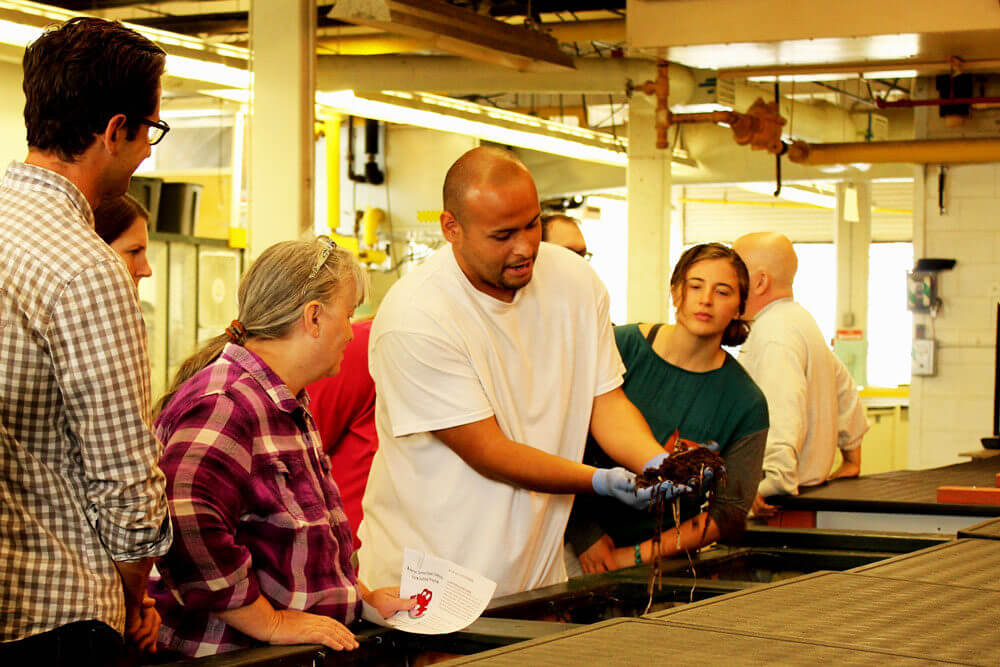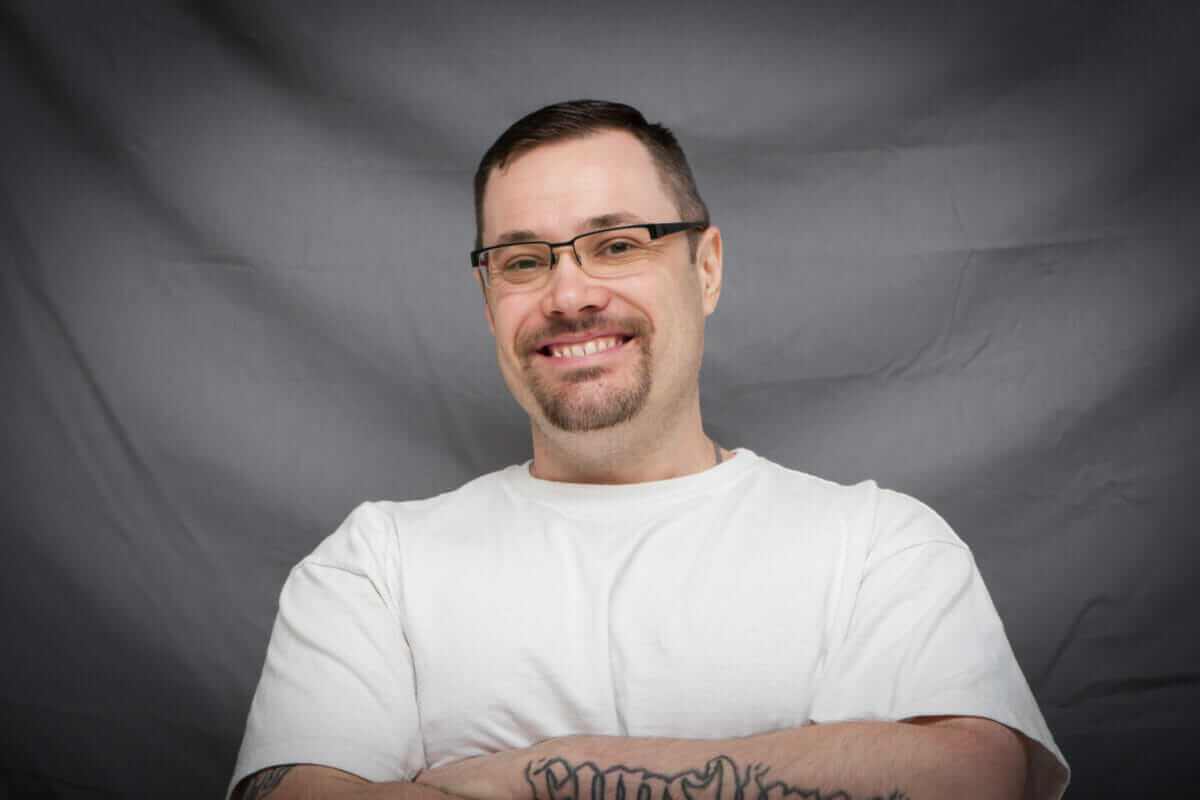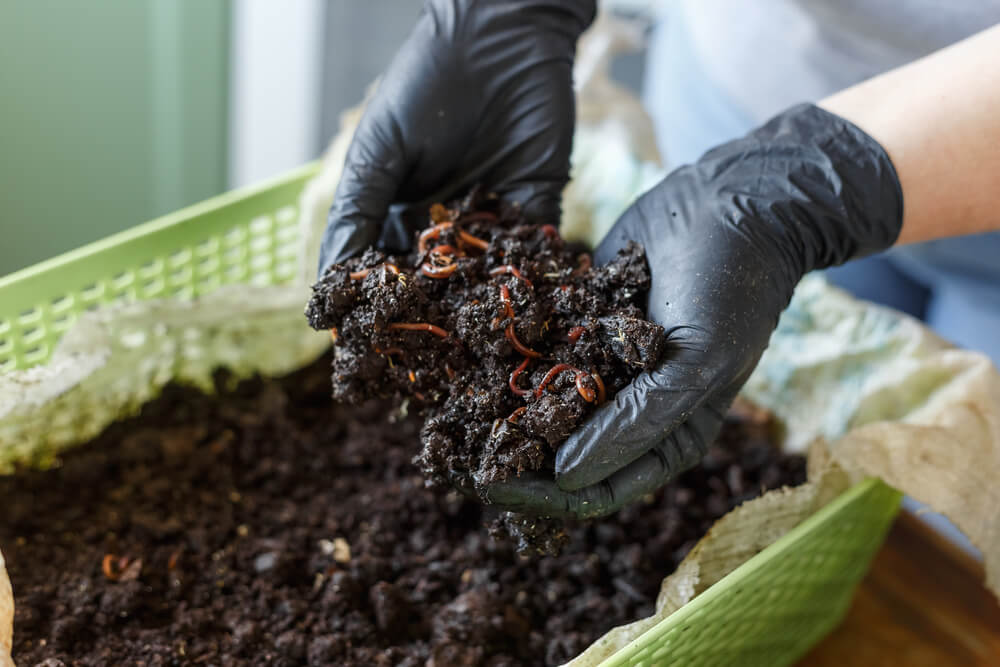Spotlight On the Visionaries Running a Worm Farm In Prison
Sustainability programs in prisons can benefit the environment, society and incarcerated people alike.
Spotlight On the Visionaries Running a Worm Farm In Prison
Sustainability programs in prisons can benefit the environment, society and incarcerated people alike.

Lead technician Juan Hernandez describes worm composting for program visitors.courtesy of Sadie Gilliom, Sustainability in Prisons Project.
Every morning when we go to work at the Sustainable Practices Lab at Washington Corrections Center in Shelton, Washington, we come around the corner of the greenhouse and are greeted like heroes by a flock of eager chickens.
Little Red, the smallest and youngest of the ladies, knows she holds my heart. She’ll have her fill of treats and then hang around my feet until she receives the massage she’s come to expect. I’ll rub the sides of her little wings and move to her back and neck. Then she’ll fluff her feathers, give a little look back and run off to hang with the flock. Although I don’t think she knows it, after almost 20 years of incarceration, these moments are a big part of what helps remind me that my world is more than just concrete walls and barbed-wire fences. She makes this place a whole lot better—all the chickens do, as they allow us to be human and love something beyond ourselves.
Our chicken program, which we fund by raising the chickens, gathering their eggs and selling them to the guards and prison staff, is just one of many developed by the Sustainability in Prisons we Project (SPP), which aims to reduce the environmental impact of prisons and provide relevant job skills in sustainable practices to prisoners. SPP programs range from conservation projects that restore native plants to endangered frogs, therapy dogs, beekeeping and the aforementioned chickens. While we love our chickens, the program for which Washington Corrections Center is most known is its bugs—worms and flies, to be exact.
After building a highly acclaimed food waste management system at the now-closed Washington State Reformatory—one of five facilities that made up the state’s Monroe Correctional Complex—Nick Hacheney, better known by his fellow prisoners as the “Worm Dude,” was invited to relocate to Washington Corrections Center to start a similar program about a year ago. He was quickly joined by Juan Hernandez, the lead technician at the reformatory’s worm farm, as well as myself. We are now busy working with prison staff to build an infrastructure to match the success they had at the other facility.

The idea behind our new waste management program is simple. Prisons have a huge environmental and social impact; they’re bad for the people who live there, the people who work there and for the planet. Research shows that prisons may be ineffective at rehabilitating the prisoners held within their walls and that, upon release, many formerly incarcerated people struggle to reintegrate into society.
The science behind the program is simple as well. The EPA estimates that more than 76 billion pounds of food waste goes to landfills every year, and untreated food waste produces methane, a major contributor to global warming. At the Monroe Correctional Complex worm farm, which Nick helped build, prisoners built an infrastructure that accepts 100 percent of the food waste from the kitchen, processes it and then feeds it to one of three systems.
The first system involves worms. These hipster vegans of the operation convert fruit and vegetable waste into worm castings, a high-end fertilizer often referred to as “black gold.” The second system is known as the Bokashi composting method, an anaerobic process that breaks down food waste using lactic acid-producing bacteria. Prisoners treat the food waste with bran inoculated with the bacteria and let it pickle in 55-gallon barrels for a month or more before burying it in the ground to further decompose or feed it to other systems. The third system involves black soldier flies, the omnivores of the operation. They eat everything and at a ferocious rate, converting as much as 80 percent of the food waste into biomass. The grubs can then be fed to chickens or fish.
Knowing that people who complete vocational and collegiate programs in prison are far less likely to recidivate and are more able to break the cycles of poverty that often lead to incarceration, Nick developed the curriculum for a 1,000-hour vermicomposting certification at his previous prison facility in 2016. He did this in collaboration with Evergreen College and Tilth Alliance, a nonprofit organic gardening organization. The program allowed participants to earn college credit, work with outside sustainability experts, participate in workshops and gain marketable skills in multiple sustainable practices. Since the closure of WSRU at the Monroe Correctional Complex in 2020, the program has been paused, but Nick hopes to get it up and running at the Washington Corrections Center as soon as it’s safe to do so.

For Nick and Juan, the rehabilitative aspect of the work is the most rewarding part, and they hope to revolutionize the way people reintegrate back into society after leaving prison. Over the past nine years, they’ve trained dozens of technicians in sustainable practices and have helped many get their 1,000-hour vocational certificates. Many participants have said that working on the worm farm was the first place they got to experience peace in prison. There’s something very powerful and restorative about caring for another living creature, even if it’s just a worm.
“Some of these guys had never even put their hands in the dirt before and would be amazed to learn that the soil is alive,” says Nick.
It may come as a surprise to learn that many prisoners care deeply about the environment and very much want to be a part of solutions to the problems facing the world today. Often, prisoners struggle to find a way to pay their debt back to the communities they’ve harmed in coming to prison. SPP’s programs and working with nature serve as a therapeutic output, offering many of us the ability to undo some of the harm that prison inflicts on the incarcerated.
Over the past six years, Nick and Juan have studied everything they could about life after prison, trying to parse out what distinguishes those who successfully reintegrate into society from those who recidivate. They spoke with people who had gotten out and then returned to prison, trying to understand what went wrong and what their largest obstacles were. They studied issues such as Post-Incarceration Syndrome, which is similar to PTSD and is experienced by many people who have been incarcerated.
Nick and Juan next looked beyond their prison walls to programs on the outside, such as business incubators that help nurture ideas and growth. Then, inspired by Shinrin-Yoku, the traditional Japanese practice of immersing oneself in nature, Nick and Juan took the first steps to formalize their organization in 2020. The Environmental Advancement Reintegration Network (EARN), as they called it, is a nonprofit business incubator and accelerator for prisoners who want to start a business or nonprofit in the environmental or sustainability field.
While incarcerated, many prisoners develop tremendous adaptability and learn to be highly innovative. And while they are often extremely motivated to succeed, they frequently face multiple obstacles upon release—including housing challenges and limited employment opportunities, as well as a lack of family and community support. The goal of EARN is to remove those barriers and create a platform for people coming out of prison by allowing them a chance to develop their ideas while living in a restorative sustainable community.
EARN is not just about creating second chances, it is about creating second-chance employers who are dedicated to making a positive environmental impact. As Juan likes to say, “It’s not just about recycling food waste, it’s about recycling people.”
We cannot change the harm we’ve caused our communities, but we can learn to be accountable for that harm and work to never do so again. And, most importantly, we can learn to give far more than we take. It may seem small to many people, taking care of chickens and bugs. However, it feels good to be a part of something—supporting the growth of a living being—and giving back to our planet.
Christopher Blackwell, 40, is serving a 45-year prison sentence in Washington State. He co-founded Look 2 Justice, an organization that provides civic education to system-impacted communities and actively works to pass sentence and policy reform legislation. He is currently working towards publishing a book on solitary confinement. His writing has been published by the Washington Post, The Boston Globe, Huff Post, Insider, and many more outlets. You can follow him and be in touch on Twitter: @chriswblackwell
Nick Hacheney is incarcerated at the Washington Corrections Center. He is a longtime advocate for environmental and educational programs in prison. He has previously published in BioCycle magazine, The Crime Report and presented a Tedx Talk on the environmental program he founded in prison. He is also the co-founder of Environmental Advancement Reintegration Network (EARN), a business incubator/launching platform for prisoners seeking to build an environmental solutions business upon their release.
Follow us

This work is licensed under a Creative Commons Attribution-NoDerivatives 4.0 International License.
Want to republish a Modern Farmer story?
We are happy for Modern Farmer stories to be shared, and encourage you to republish our articles for your audience. When doing so, we ask that you follow these guidelines:
Please credit us and our writers
For the author byline, please use “Author Name, Modern Farmer.” At the top of our stories, if on the web, please include this text and link: “This story was originally published by Modern Farmer.”
Please make sure to include a link back to either our home page or the article URL.
At the bottom of the story, please include the following text:
“Modern Farmer is a nonprofit initiative dedicated to raising awareness and catalyzing action at the intersection of food, agriculture, and society. Read more at <link>Modern Farmer</link>.”
Use our widget
We’d like to be able to track our stories, so we ask that if you republish our content, you do so using our widget (located on the left hand side of the article). The HTML code has a built-in tracker that tells us the data and domain where the story was published, as well as view counts.
Check the image requirements
It’s your responsibility to confirm you're licensed to republish images in our articles. Some images, such as those from commercial providers, don't allow their images to be republished without permission or payment. Copyright terms are generally listed in the image caption and attribution. You are welcome to omit our images or substitute with your own. Charts and interactive graphics follow the same rules.
Don’t change too much. Or, ask us first.
Articles must be republished in their entirety. It’s okay to change references to time (“today” to “yesterday”) or location (“Iowa City, IA” to “here”). But please keep everything else the same.
If you feel strongly that a more material edit needs to be made, get in touch with us at [email protected]. We’re happy to discuss it with the original author, but we must have prior approval for changes before publication.
Special cases
Extracts. You may run the first few lines or paragraphs of the article and then say: “Read the full article at Modern Farmer” with a link back to the original article.
Quotes. You may quote authors provided you include a link back to the article URL.
Translations. These require writer approval. To inquire about translation of a Modern Farmer article, contact us at [email protected]
Signed consent / copyright release forms. These are not required, provided you are following these guidelines.
Print. Articles can be republished in print under these same rules, with the exception that you do not need to include the links.
Tag us
When sharing the story on social media, please tag us using the following: - Twitter (@ModFarm) - Facebook (@ModernFarmerMedia) - Instagram (@modfarm)
Use our content respectfully
Modern Farmer is a nonprofit and as such we share our content for free and in good faith in order to reach new audiences. Respectfully,
No selling ads against our stories. It’s okay to put our stories on pages with ads.
Don’t republish our material wholesale, or automatically; you need to select stories to be republished individually.
You have no rights to sell, license, syndicate, or otherwise represent yourself as the authorized owner of our material to any third parties. This means that you cannot actively publish or submit our work for syndication to third party platforms or apps like Apple News or Google News. We understand that publishers cannot fully control when certain third parties automatically summarize or crawl content from publishers’ own sites.
Keep in touch
We want to hear from you if you love Modern Farmer content, have a collaboration idea, or anything else to share. As a nonprofit outlet, we work in service of our community and are always open to comments, feedback, and ideas. Contact us at [email protected].by Christopher Blackwell with Nick Hacheney, Modern Farmer
February 3, 2022
Modern Farmer Weekly
Solutions Hub
Innovations, ideas and inspiration. Actionable solutions for a resilient food system.
ExploreExplore other topics
Share With Us
We want to hear from Modern Farmer readers who have thoughtful commentary, actionable solutions, or helpful ideas to share.
SubmitNecessary cookies are absolutely essential for the website to function properly. This category only includes cookies that ensures basic functionalities and security features of the website. These cookies do not store any personal information.
Any cookies that may not be particularly necessary for the website to function and are used specifically to collect user personal data via analytics, ads, other embedded contents are termed as non-necessary cookies.
Beautiful story. There is something about digging into the dirt with your hands in the Spring that helps restore my soul. NO ONE is beyond redemption, and I thank these guys for trying to give back.
As per FAO it is estimated that over 50% of food produce is not reaching kitchen tables only to add further landfill stress and emitting Methane Gas. Over 70% of potable water of water resources is used for farming. Water stress and water footprint are some of the pressing issues for many. Why “Grow and Throw”? Why not recycle post farm produce? Why not create circular economy from food waste streams? Why not curb Methane Gas from the source? Why not empower with equal economic for many who are falling through the cracks? The answers are available. Innovation to propel… Read more »
Great initiative It will be wonderful if greenhouse to grow fruits and vegetables is also added. Food waste is also converted to 100% Pathogens Free water and sterile biomass ideal for soil amendments and feeds for fish and poultry.
#sustainabilityisnecessity
Visit http://www.provectusenterprising.com for details.
great story with good work being done, keep your hands dirty in the good clean dirt!
Great story!